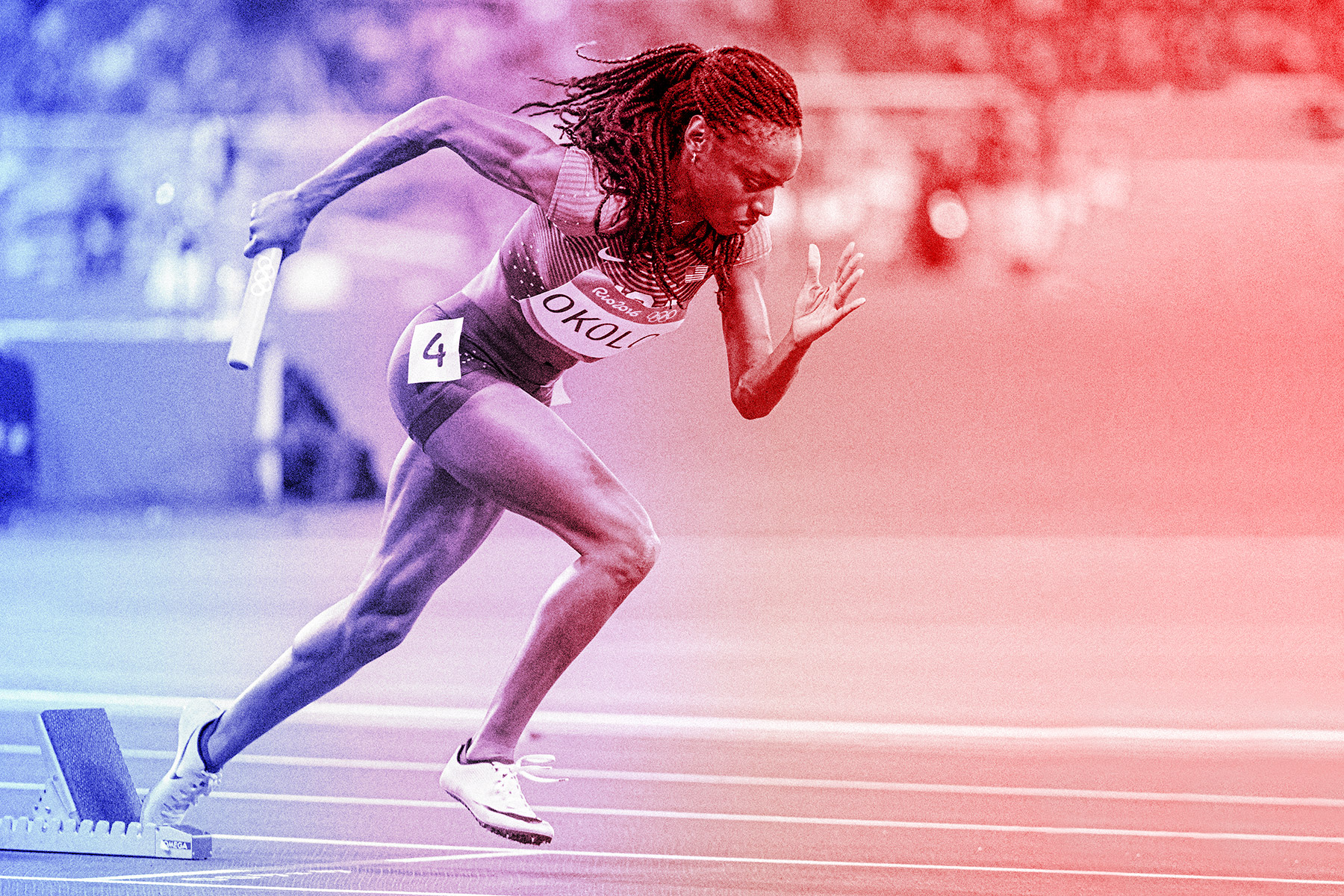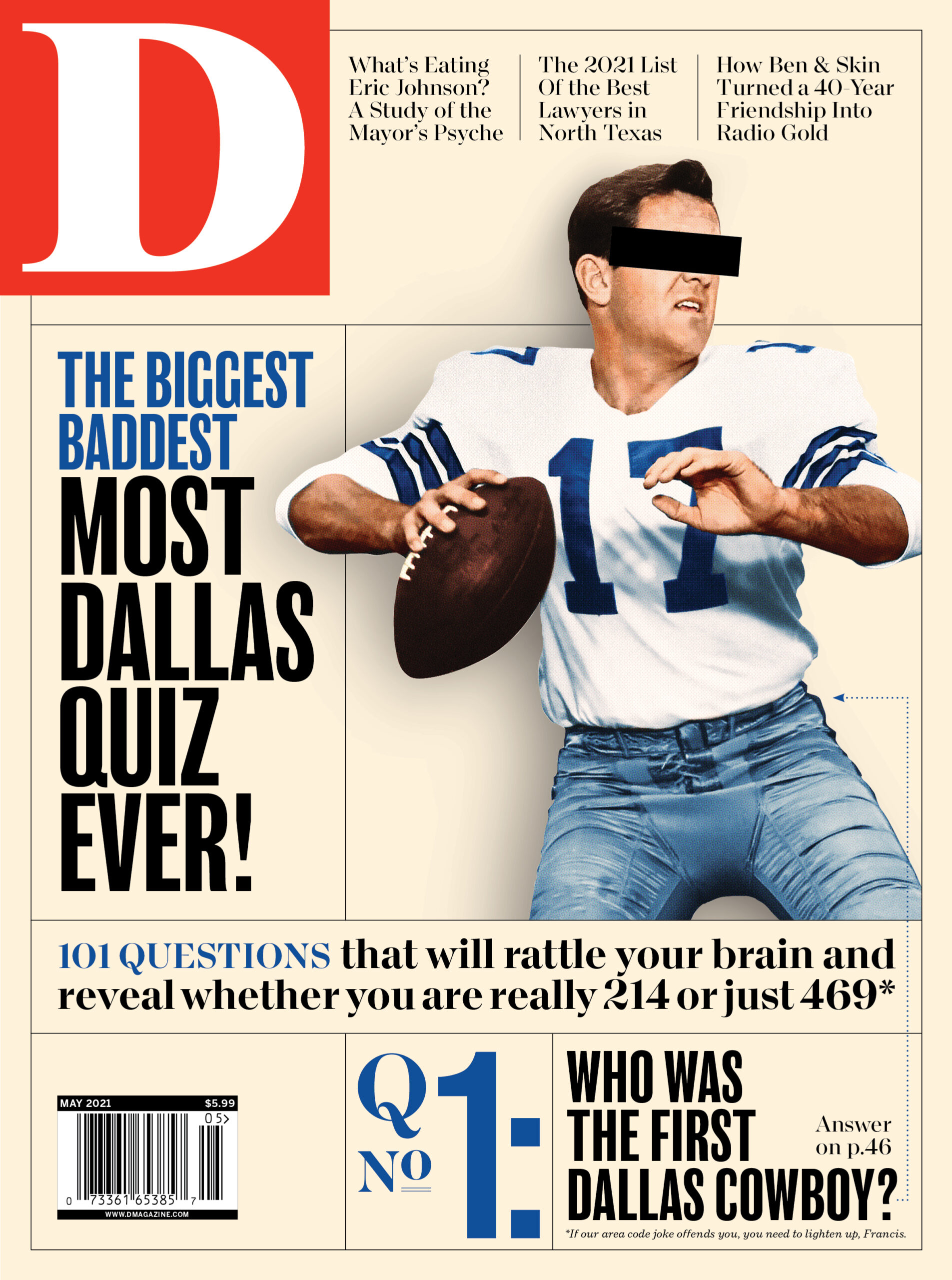Courtney Okolo didn’t grow up with Olympic dreams. In her Nigerian American family, education was the top priority, not sports. When she became a star runner in high school in Carrollton, her parents took it in stride.
“They were like, ‘Oh, she runs. She’s good at it,’ ” she recalls with a laugh. “As long as it didn’t interfere with school, they didn’t have a problem with it.”
So Courtney kept running, all the way to the 2016 Olympics in Rio de Janeiro, where she won a gold medal. Now she is aiming for the Tokyo Olympics, finally set to begin on July 23, after a yearlong delay due to the pandemic. It has been an unprecedented journey, training while the world shut down. The early days were especially tricky, as closures forced her and her training mates to hop from one track facility to the next. They wound up spending a lot of time running on grass fields.
The postponement created mental hurdles as well. When she first heard the news of the delay, last spring, she says, “I wasn’t sure what I was training for. I didn’t necessarily lose motivation because training was the only thing I looked forward to each day, since there was nothing else to do. But I was unsure what the rest of the summer would look like.”
There was even a chance that the Tokyo Games might not happen. In the end, with the Olympic trials now scheduled for June 18–27 in Eugene, Oregon, Courtney believes she is stronger for having gone through it all. “The whole experience just made me a lot more flexible and better at adapting and improvising in order to get the job done,” she says.
Now 27, Courtney has been setting high standards for herself ever since she was a kid in Carrollton, keeping a journal of goals she wanted to achieve. She joined her first school track team as a freshman at Newman Smith High School, becoming a standout in the 400-meter. Courtney made it to the regionals that year but not to the state championships, which became a motivator. She would win state titles the next three years.
The youngest of four siblings, Courtney grew up between worlds. Her father had come to America from Nigeria in 1978, and he liked to share stories of his life with the kids at Thanksgiving. A favorite: his tale of landing in New York City in the middle of winter.
“I came here in January,” David Okolo says. “January in Nigeria is one of the hottest months, and you know what January in New York looks like! No one told me what to expect; I didn’t have even a sweater.” David was 27 and had come to attend college at Langston University in Oklahoma, having saved up money to get here by working at a bank for years. When he landed, he looked out the windows and saw something he’d never seen before: people’s breath condensing in the frigid air. “When people opened their mouths, you could see this thick smoke. I thought, Wow, I see white smoke but no cigarettes. When I went outside, white smoke was coming out from my mouth, too.”
And then, as he shivered in the shocking cold, an act of kindness. “An older White man saw what I was going through,” he says. “He saw that I was from somewhere else. He had two jackets; he gave me one of them.”
Later, when he landed in Oklahoma, another stranger gave him a hand. David was trying to figure out how to get to Langston from Oklahoma City, asking random people about buses. “Luck was on my side,” he says. “While I was asking, one of the guys I bumped into was another Nigerian, and he knew where Langston is. He was like an angel, a godsend.” The man paid for him to stay the night in a hotel, then drove him to a bus stop the next morning and paid his fare.
It’s a story David has long told his children. “One thing that taught me is to treat strangers with compassion,” he says. “This man went above and beyond. He didn’t let me spend even a dime of my money. I didn’t get his phone number to call and thank him later on. He just bumped into my life and was gone.” David went on to get both an undergraduate degree and an MBA from the University of Central Oklahoma.
Later he met his wife, Comfort, on a visit to Nigeria, and the two settled in Texas. Over the years, they kept a close eye on their children, his daughter says, because that was the culture they knew. “My parents were, I guess, more strict than typical American parents,” Courtney says. “But I was a pretty chill kid. I didn’t feel like I was missing out or anything. Just like any first-generation kid, we all kind of go through the same thing. With parents, there’s always a disconnect with kids, but having immigrant parents, there’s really a disconnect because they didn’t even grow up the same way you did.” She says TV shows like The Fresh Prince of Bel-Air and The Cosby Show helped her learn about American culture.
As the youngest in the family watching her older siblings test limits with her parents, she learned the boundaries from an early age. “We didn’t really go out,” she says, laughing. “If we wanted to go hang out with friends, the amount of questions they would ask us, it was like ‘I don’t even want to go.’ ”
Her parents often emphasized the opportunities in the United States. “They always made a point that we needed to be grateful,” she says. “Here in America, we had everything we needed. If we ever seemed ungrateful, they would remind us.” When she was 10, she spent three weeks in Nigeria with American cousins, an experience she hopes to have again as an adult.
As her star rose on the track in her teens, Courtney didn’t really picture herself heading to the Olympics one day. “It was too far away,” she says. “I mean, I watched the Olympics in 2008 and in 2012, but it was hard to imagine. I was just running high school; I just wanted to win state.”
Meanwhile, her dad came to realize that her athletic prowess was something special, but his emphasis remained on academics. That’s why he had come to America; he had never met anyone who had made a living from running. Then a coach told him that colleges would come calling for his daughter. “That got my attention,” David says.
After graduating from high school in 2012, Courtney went on to compete at the University of Texas, where she majored in exercise science with a minor in African and African diaspora studies. Juggling sports and school “definitely was a challenge sometimes,” she says, but the school helped student-athletes adjust, helping them designate specific times for study amid all the training. She graduated in 2016 with a slew of collegiate and international titles and honors, including the prestigious Bowerman Award, which recognizes the best student-athletes in college sports. Along the way, she set a collegiate record in the 400-meter, then broke her own record.
And in August 2016, she made the Olympic team, competing for Team USA in the 4×400-meter relay in Rio. While it felt great to make the Olympic team, she says, it was also a heavy weight lifted. “I think I was more relieved because I didn’t want to see everybody going and be stuck at home,” she says, adding that she wished she had performed better at the Olympic trials. “I wanted to do better than I did. I barely made the team. I didn’t really meet my expectations, so it was kind of bittersweet.” Courtney returned home with a gold medal—and a drive to do better next time.
Her father recalls watching her win gold on TV from home. “That was the surprise of our life,” David says. “We knew they had a good team, but I wasn’t expecting they would get the gold. We were jumping up and down.”
That same year, she took home the gold in the 4×400-meter relay at the World Athletics Indoor Championships. In 2018, she won the gold in both the 400-meter and the relay at the World Athletics Indoor Championships. (The 2020 event was postponed; it will now be held in 2023.) And now, at long last, Courtney hopes to score gold again, a goal that was delayed but fortunately not eliminated by the coronavirus. It was a yearlong journey that took her to places she didn’t expect.
Amid the quiet days of the pandemic, Courtney found a creative outlet to accompany her training: designing her own greeting cards, which she sells on Etsy and on her site OG Illustrations. She got inspired to design the cards—featuring inclusive images of people celebrating various life events—while looking for a card for a friend who was graduating from dental school. “I wanted something really good for her graduation, and I couldn’t find anything,” she says. So she made one herself using an image of her friend—and then kept going.
The pandemic also gave her time to reflect on what has been happening off the track. Courtney says she is proud to see the protests against racial injustice that have grown over the past year, but she feels there’s a long way to go before true change can happen. Her heart is with the families who have lost loved ones to police violence, she says. “It’s heart-wrenching, especially when you really start to think about the families. It’s really disturbing.
“Protests definitely are good because it shows how important it is to people,” she says. “If people weren’t protesting, people would be passive about it, like, ‘Oh, it’s not a big deal that this person got killed.’ So I feel like the protests definitely show how important it is, but the protests aren’t the only thing that’s going to change the situation. It would take a lot of work.”
That’s another race to run.
This story originally ran in the May issue of D Magazine with the title “A Race Against Time.” Abigail Pesta is an award-winning investigative journalist and the author of The Girls: An All-American Town, a Predatory Doctor, and the Untold Story of the Gymnasts Who Brought Him Down.
Write to [email protected].






